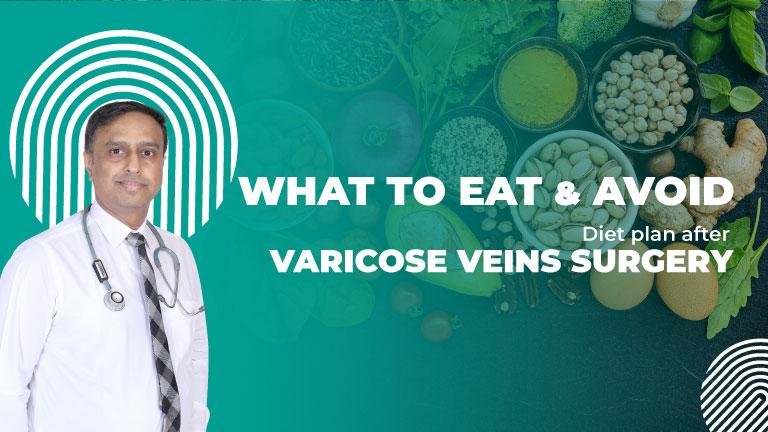After varicose vein surgery, maintaining a healthy diet can support your recovery and overall vascular health. Nutrient-rich foods, such as fruits, vegetables, lean proteins, whole grains, and healthy fats, provide essential vitamins, minerals, and antioxidants that aid in tissue repair, reduce inflammation, and promote optimal blood circulation. A balanced diet supports the body’s recovery process, helps manage weight, and reduces the risk of complications like deep vein thrombosis. Here are some dietary changes you can follow and include the list of foods to eat and avoid the foods that may hinder healthy recovery:
Foods to Eat After Varicose Vein Surgery:
High-Fiber Foods: Opt for whole grains, fruits, vegetables, and legumes. Fiber helps regulate bowel movements and supports overall cardiovascular health.
Lean Proteins: Incorporate lean protein sources such as poultry, fish, beans, and tofu. Protein aids in tissue repair and healing.
Healthy Fats: Choose sources of healthy fats like avocados, nuts, seeds, and olive oil. Omega-3 fatty acids found in fatty fish (salmon, mackerel, sardines) can help reduce inflammation and promote heart health.
Colorful Fruits and Vegetables: These are rich in antioxidants, vitamins, and minerals that support immune function and help reduce inflammation.
Water: Staying hydrated is crucial for preventing blood clot formation and promoting circulation.
Citrus Fruits: Citrus fruits like oranges, grapefruits, and lemons contain vitamin C, which supports collagen production and strengthens blood vessels.
Leafy Greens: Greens like spinach, kale, and Swiss chard are rich in vitamins and minerals that support vascular health.
Foods to Avoid or Limit After Varicose Vein Surgery:
Processed Foods: Highly processed foods often contain unhealthy fats, excess sodium, and additives that can contribute to inflammation and cardiovascular issues.
Sugary Snacks and Beverages: Excessive sugar intake can contribute to weight gain and inflammation. Limit sugary snacks, sodas, and sugary drinks.
Sodium: High-sodium foods can lead to water retention and swelling. Reduce your intake of salty foods and processed items.
Trans Fats: Trans fats, often found in fried and packaged foods, can negatively impact heart health.
Caffeine and Alcohol: While these can be consumed in moderation, excessive caffeine and alcohol intake can lead to dehydration and potentially affect circulation.
Excessive Red Meat: Limit your consumption of red meats, as they can be high in saturated fats.
Refined Grains: Foods made with white flour (white bread, pastries, etc.) can cause spikes in blood sugar levels and lack the fiber found in whole grains.
Excessive Dairy Fat: Full-fat dairy products can be high in saturated fats, so opt for lower-fat versions or plant-based alternatives.
Sample Diet Plan to Follow After Varicose Vein Surgery
Here’s a sample diet plan for a day to follow after varicose vein surgery. Remember that individual dietary needs can vary, so adjust this plan based on your preferences and any specific recommendations from your healthcare provider:
Breakfast:
- Scrambled eggs with spinach and tomatoes
- Whole grain toast
- Fresh orange juice or a citrus fruit
- Herbal tea or water
Mid-Morning Snack:
- Greek yogurt with mixed berries and a drizzle of honey
- Handful of almonds or walnuts
Lunch:
- Grilled chicken salad with mixed greens, cucumbers, bell peppers, and avocado
- Olive oil and balsamic vinegar dressing
- Quinoa or brown rice on the side
- Water or herbal tea
Afternoon Snack:
- Carrot and celery sticks with hummus
- Sliced apple with nut butter
Dinner:
- Baked salmon fillet with a squeeze of lemon
- Steamed broccoli and roasted sweet potatoes
- Whole grain roll or bread
- Herbal tea or water
Evening Snack:
- Sliced pear with a handful of mixed nuts
Hydration:
- Throughout the day, make sure to drink plenty of water to stay hydrated. You can also have herbal teas, infused water with slices of lemon or cucumber, and limit caffeinated and sugary beverages.
Notes and guidelines on a diet to follow post-varicose vein surgery
- This sample diet plan includes a balance of lean proteins, whole grains, healthy fats, and plenty of fruits and vegetables to support healing and overall health.
- Aim for small, frequent meals to prevent overeating and maintain steady energy levels.
- Choose foods rich in vitamins C and K, as they can support collagen production and help with wound healing.
- Incorporate foods with anti-inflammatory properties, such as fatty fish, berries, nuts, and leafy greens.
- Avoid excessive sodium, sugary snacks, and processed foods.
- If you have any dietary restrictions or specific nutritional needs, consult your healthcare provider or a registered dietitian for personalized guidance.
Wrap-up Tips on after varicose vein surgery diet plan:
Never hesitate to ask your doctor: What to eat and what not to eat post-varicose vein surgery. This is just a sample plan, and listening to your body’s cues and adjusting your diet as needed is important. Remember, a balanced and varied diet is essential for promoting healing and preventing complications after surgery. Consult with your healthcare provider or a registered dietitian for personalized dietary recommendations based on your specific health needs and preferences.






